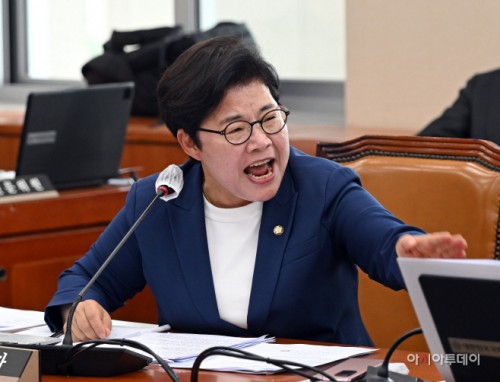 |
| Lim Yi-ja, a ruling party secretary of the National Assembly’s Environmental Labor Committee, makes a statement at a plenary session of the Environmental Labor Committee held at the National Assembly on May 24, 2023./ Photographed by Song Eui-joo (songuijoo@) |
AsiaToday reporter Park Ji-eun
The pro-labor bill known as the “yellow envelope bill,” which strictly restricts filing damage suits against striking workers, has been directly referred to the National Assembly’s plenary session led by the main opposition Democratic Party (DP) on Wednesday despite strong protests from the ruling People Power Party (PPP).
At the National Assembly’s Environmental and Labor Committee, the DP skipped the Judiciary Committee’s review despite strong opposition from the ruling party and pushed to refer the revision of the Trade Union and Labor Relations Adjustment Act directly to the plenary session for a vote.
The PPP and business lobbies have opposed the bill, saying it neglects the situation in which the global economic crisis may worsen and only gives excessive immunity to unionized workers.
According to Article 86 of the National Assembly Act, a parliamentary committee can send a bill directly to a plenary session for final approval if the judiciary committee takes no action for more than 60 days after taking over the bill.
The yellow envelope bill was passed by the opposition party alone through the labor committee on February 21, but it has since been pending in the judiciary committee chaired by the ruling party for nearly 90 days.
If the bill is directly referred to the plenary session of the National Assembly, it can be proposed by an agreement between the Speaker of the National Assembly and the representatives of the negotiating group. If an agreement is not reached within 30 days, it should be decided by an anonymous vote at the first plenary session to be held afterwards.
As the opposition party is willing to directly transfer the bill to the plenary session soon, President Yoon Suk-yeol may exercise his veto power.
Yoon previously rejected two opposition-led bills – a nursing act and a revision to the Grain Management Act.
#labor committee #yellow envelope bill #DP #veto
Copyright by Asiatoday
Most Read
-
1
-
2
-
3
-
4
-
5
-
6




















